英语必修5unit3集体备课
人教版英语必修五Unit 3单元整体教学教案
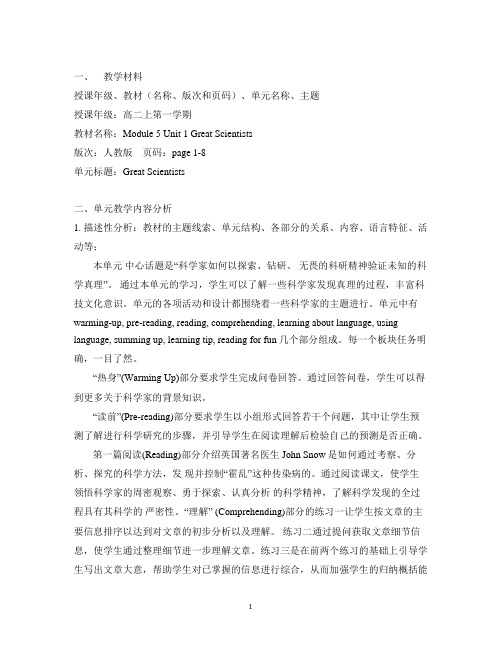
一、教学材料授课年级、教材(名称、版次和页码)、单元名称、主题授课年级:高二上第一学期教材名称:Module 5 Unit 1 Great Scientists版次:人教版页码:page 1-8单元标题:Great Scientists二、单元教学内容分析1. 描述性分析:教材的主题线索、单元结构、各部分的关系、内容、语言特征、活动等;本单元中心话题是“科学家如何以探索、钻研、无畏的科研精神验证未知的科学真理”。
通过本单元的学习,学生可以了解一些科学家发现真理的过程,丰富科技文化意识。
单元的各项活动和设计都围绕着一些科学家的主题进行。
单元中有warming-up, pre-reading, reading, comprehending, learning about language, using language, summing up, learning tip, reading for fun几个部分组成。
每一个板块任务明确,一目了然。
“热身”(Warming Up)部分要求学生完成问卷回答。
通过回答问卷,学生可以得到更多关于科学家的背景知识。
“读前”(Pre-reading)部分要求学生以小组形式回答若干个问题,其中让学生预测了解进行科学研究的步骤,并引导学生在阅读理解后检验自己的预测是否正确。
第一篇阅读(Reading)部分介绍英国著名医生John Snow是如何通过考察、分析、探究的科学方法,发现并控制“霍乱”这种传染病的。
通过阅读课文,使学生领悟科学家的周密观察、勇于探索、认真分析的科学精神,了解科学发现的全过程具有其科学的严密性。
“理解” (Comprehending)部分的练习一让学生按文章的主要信息排序以达到对文章的初步分析以及理解。
练习二通过提问获取文章细节信息,使学生通过整理细节进一步理解文章。
练习三是在前两个练习的基础上引导学生写出文章大意,帮助学生对已掌握的信息进行综合,从而加强学生的归纳概括能力,同时通过理解后的语言输出活动帮助学生更完整地理解文章。
英语必修5unit3集体备课
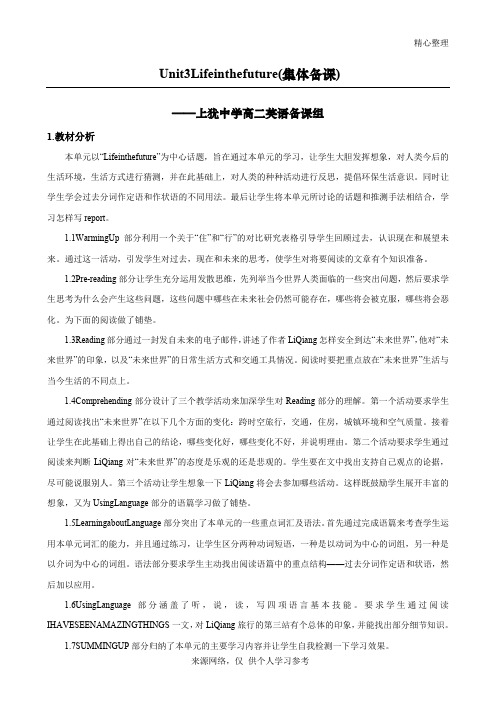
精心整理Unit3Lifeinthefuture(集体备课)——上犹中学高二英语备课组1.教材分析本单元以“Lifeinthefuture”为中心话题,旨在通过本单元的学习,让学生大胆发挥想象,对人类今后的生活环境,生活方式进行猜测,并在此基础上,对人类的种种活动进行反思,提倡环保生活意识。
同时让“未1.5LearningaboutLanguage部分突出了本单元的一些重点词汇及语法。
首先通过完成语篇来考查学生运用本单元词汇的能力,并且通过练习,让学生区分两种动词短语,一种是以动词为中心的词组,另一种是以介词为中心的词组。
语法部分要求学生主动找出阅读语篇中的重点结构——过去分词作定语和状语,然后加以应用。
1.6UsingLanguage部分涵盖了听,说,读,写四项语言基本技能。
要求学生通过阅读IHAVESEENAMAZINGTHINGS一文,对LiQiang旅行的第三站有个总体的印象,并能找出部分细节知识。
1.7SUMMINGUP部分归纳了本单元的主要学习内容并让学生自我检测一下学习效果。
1.8LEARNINGTIP部分告诉学生在讨论时记笔记的好处和方法。
2.教材重组2.1可将WarmingUp,Pre-reading,Reading和Comprehending整合在一起上一节精读课。
2.2UsingLanguage中的reading和listening是LiQiang’straveltoth efuture的延续,可将这两部分及Workbook中的LISTENING整合起来上一节听力课。
2.3可将LearningaboutLanguage和Workbook中的USINGWORDSANDEXPRESSIONS及USINGSTRUCTURES整合起来上一节语法课。
3.2.1.vehicle[v'i:ikl]交通工具;车辆【巧记提示】词根vect,“传送;运载”。
【经典例句】Thestreetisdominatedbycar vehicles街道上满是车辆。
英语高二(上)人教版新课标必修(5)unit 3:同步教案((3)
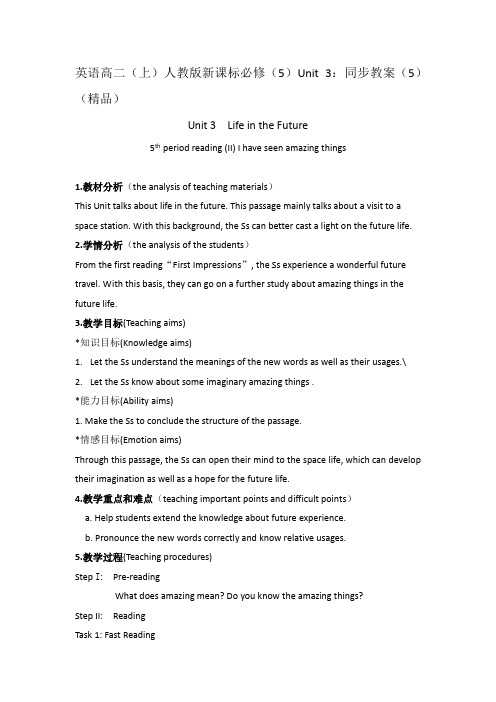
英语高二(上)人教版新课标必修(5)Unit 3:同步教案(5)(精品)Unit 3 Life in the Future5th period reading (II) I have seen amazing things1.教材分析(the analysis of teaching materials)This Unit talks about life in the future. This passage mainly talks about a visit to a space station. With this background, the Ss can better cast a light on the future life. 2.学情分析(the analysis of the students)From the first reading“First Impressions”, the Ss experience a wonderful future travel. With this basis, they can go on a further study about amazing things in the future life.3.教学目标(Teaching aims)*知识目标(Knowledge aims)1.Let the Ss understand the meanings of the new words as well as their usages.\2.Let the Ss know about some imaginary amazing things .*能力目标(Ability aims)1. Make the Ss to conclude the structure of the passage.*情感目标(Emotion aims)Through this passage, the Ss can open their mind to the space life, which can develop their imagination as well as a hope for the future life.4.教学重点和难点(teaching important points and difficult points)a. Help students extend the knowledge about future experience.b. Pronounce the new words correctly and know relative usages.5.教学过程(Teaching procedures)Step I: Pre-readingWhat does amazing mean? Do you know the amazing things?Step II: ReadingTask 1: Fast ReadingWhat is the shape of the space station? How many stops did I have? Task 2: Careful readingListen to the tape and try to fill in the form on p23.Step III: Words and expressions1.instant n.瞬间in an instantadj.立即的一…就…the instant/instantly2.turn into变成turn in 上交turn up 出现,调高turn down 拒绝,调低turn out 结果是turn to 转向,向…求助3.副词/介词短语放句首+谓语+主语(名词非代词)e.g: Here comes the bus. Under the tree sits a boy.6.知识结构(板书设计)副板书:主板书:turn to 转向,向…求助3.副词/介词短语放句首+谓语+主语(名词非代词)e.g: Here comes the bus. Under the tree sits a boy.7.问题研讨(课堂提问,练习和作业设计)1.课堂提问(questions)(1)What does amazing mean? Do you know the amazing things?(2 ) What is the shape of the space station? How many stops did I have?2.作业(homework)BC类:read the new words twice from citizen to motivation.ABC类:①You see the lightning ___ it happens, but you hear the thunder later.A. the instantB. for an instantC. on the instantD. in an instant②At the foot of the mountains _______.A. a village lieB. lies a villageC. does a village lieD. lying a village③当情况变得非常糟糕时,我向我的家人寻求帮助。
高二英语必修五unit3教案
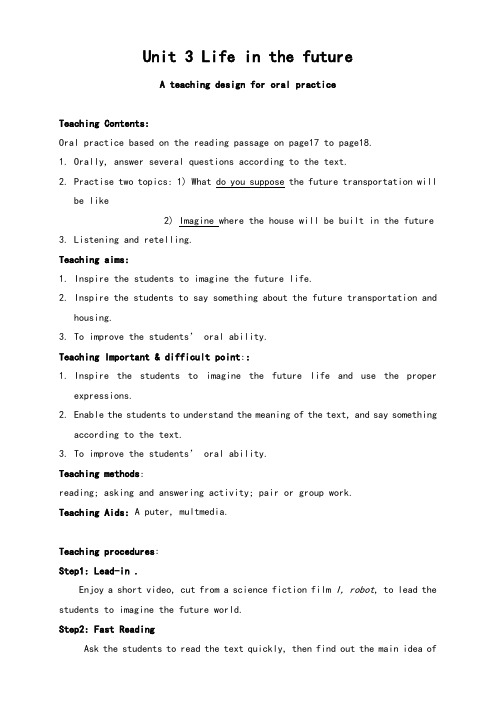
Unit 3 Life in the futureA teaching design for oral practiceTeaching Contents:Oral practice based on the reading passage on page17 to page18.1. Orally, answer several questions according to the text.2.Practise two topics:1) What do you suppose the future transportation willbe like2) Imagine where the house will be built in the future3. Listening and retelling.Teaching aims:1.Inspire the students to imagine the future life.2.Inspire the students to say something about the future transportation andhousing.3.To improve the students’ oral ability.Teaching Important & difficult point::1.Inspire the students to imagine the future life and use the properexpressions.2.Enable the students to understand the meaning of the text, and say somethingaccording to the text.3.To improve the students’ oral ability.Teaching methods:reading; asking and answering activity; pair or group work.Teaching Aids: A puter, multmedia.Teaching procedures:Step1: Lead-in .Enjoy a short video, cut from a science fiction film I, robot, to lead the students to imagine the future world.Step2: Fast ReadingAsk the students to read the text quickly, then find out the main idea ofthe text,and answer several questions according to each paragraph.purpose: These questionts are simple questions, just to help the students get a brief acquaintance to the future world described in the text. Step3:Listening and retelling according to paragraph 4. Show some tips to help the students retell the sentences.Purpose: This exercise is a practice for oral test part C in NCEE. Step4:Design two topics while talking about the hovering carriage and Wang Ping’s house. Practise the dialogues of making predictions.Topic 1: What do you suppose the future transportation will be like Topic 2: Imagine where the house will be built in the futureThe students may use these structures :I suppose the transportation will be something like a ….I suppose , in the future, the house will be built in…..I imagine that ….Purpose: To practise the structure orally I suppose that… , I imagine that.. .Step5: Summary of the text orally.This passage mainly tells us about a boy named Li Qiang”s trip to the future. It tells us how he got to the future, how he felt and what he had seen. Step6: Discussion.“What’s the writer’s attitude towards the future, optimistic orpessimistic”“How do you know “The students may begin like these :•In my opinion, the writer’s attitude towards the future is _________ .•As far as I am concerned, the writer feels _________ to the future.•I think the writer has an _________ view of the future.Purpose: To learn to analyze the writer’s attitude and express your conclusion.Step7 Homework1. To talk with your chairmate on the topic:Imagine, what the future world willbe2. Review the reading passage and find out the difficult language points to you.3. Finish exercises 1,2&4 on page 19.4. Review the words and phrases of this unit. A dictation tomorrow.Display on the blackboard Unit 3 Life in the Future wh- do you suppose …. I suppose ….. I imagine that ….And some words, perhaps they will be: science fiction film, high-tech, time tunnelPs: Display on the screenStep 1. Skimming:Skim through the passage and get its general idea.The passage is mainly about.A.how Li Qiang was transported to the future.B.how Li Qiang got to the future and his first impression of it.C.what the life was like in the future.D.the introduction of the “Future Tours ”company.Go through the first paragraph (Para.1) quickly, then answer the following questions:1. What is a “time lag ”?2.Who guides my trip?3.How did he get to the future?Step 2. Detailed reading1. What is a “time lag ”?“Time lag ’’is similar to the “jet lag ”. It means a person gets flashbacks from his previous time period.2.Who guides my trip?3. And who transported us to the future?Wang Ping ’s parents ’company transported us to the future.My friend Wang Ping is my guide to the future.Para.3Go through the third paragraph, then tryto answer the following questions.1. How did I feel as soon as I was transported to the future?2. How did Wang Ping solve this problem?3. What do you think has caused this kind of problem that Li Qiang ’s head ached?1.How did I feel as soon as I wastransported to the future?I thought it was difficult to tolerate. I was hit by the lack of fresh air. 2. How did Wang Ping solve this problem?Wang Ping gave a mask to me and hurried me through to a small room nearby to have a rest.C. he felt a bit homesick.D. he was hit by a lack of fresh air.Hit by a lack of fresh air, my head ached.computer The hovering carriage is driven by ________ . These carriages _____above the ground and by ______or ________ down in your seat, you can drive it swiftly.float bending pressingPara.4Read the fourth paragraph quickly, thenanswer the following questions:1.What did Wang Ping’s house look like?2.What was the green wall made of ?3. What ’s the purpose of building this kind of green wall?1. What did Wang Ping ’s house look like?large, bright and cleanHis house is a large bright, clean room.It had a green wall, a brown floor and soft lighting.2. What was the green wall made of ?3.What ’s the purpose of building this kind of green wall?The green wall was made of trees.The leaves of the trees will provide much-needed oxygen to the house.Visiting Wang Ping ’s HomeThat is a _______________house, with a large,_____ and ____ room. It had a ______ ______, soft _______ and a _____ ____ which is actually _____. The _____ of the trees provided the room with ____________ _______. By flashing a ______ on the computer screen, bright clean green wallleavesoxygenswitchRetellstrange-looking brown floor lighting trees much-needed Imagine where the house will bebuilt in the future ?Topic :I suppose , in the future, house will be built in ….I imagine that ….This passage mainly tells us about ____________________________________________________________________Li Qiang ’s first trip to the future. It tells us how he got to the future, how he felt and what he had seen.What ’s the writer ’s attitudetowards the future, optimistic or pessimistic?How do you know?optimisticpessimistic•In my opinion, the writer ’s attitude towards the future is _________.•As far as I am concerned, the writer feels _________ to the future. •I think the writer has an _________view of the future.1.To talk with your chairmate on the topic:Imagine, what the future world will be?2.Review the reading passage and find out the difficult language points to you.3.Finish exercises 1&2on page 19.4.Review the words and phrases of this unit. A dictation tomorrow.Ten words from “lack ”to “safety belt ”.HomeworkPs: Videos are from I, Robot and The Fifth Element.。
必修五book5unit3教学案全单元精品学案
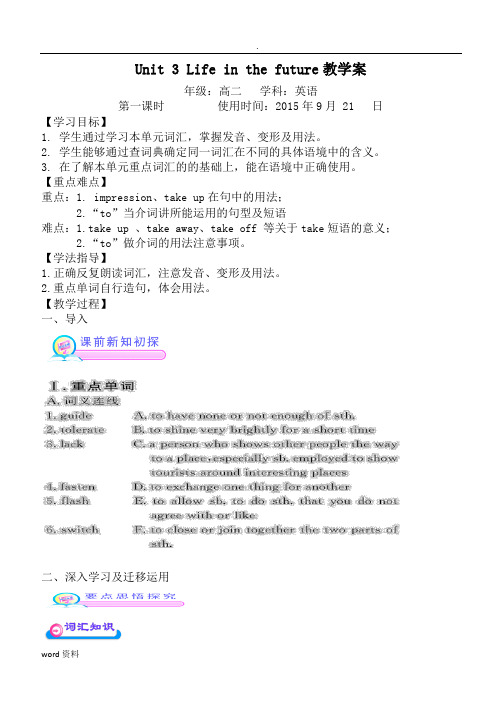
Unit 3 Life in the future教学案年级:高二学科:英语第一课时使用时间:2015年9月 21 日【学习目标】1.学生通过学习本单元词汇,掌握发音、变形及用法。
2.学生能够通过查词典确定同一词汇在不同的具体语境中的含义。
3.在了解本单元重点词汇的的基础上,能在语境中正确使用。
【重点难点】重点:1. impression、take up在句中的用法;2.“to”当介词讲所能运用的句型及短语难点:1.take up 、take away、take off 等关于take短语的意义;2.“to”做介词的用法注意事项。
【学法指导】1.正确反复朗读词汇,注意发音、变形及用法。
2.重点单词自行造句,体会用法。
【教学过程】一、导入二、深入学习及迁移运用1.impression n. [C]印象;感想;印记(P17)▶What was your first impression of London?你对伦敦的第一印象是什么?▶She made a good impression on his mother.她给他母亲留下了很好的印象。
▶I was under the impression that you hadn’t visited the city before, was I right?我以为你以前不曾到过该市,对不对?▶My father impressed on me the value of hard work.我父亲让我记住努力工作的重要性。
用impress的适当形式填空①I was very __________ with her performance.②I had a very good ___________ of him.③ She always wears a gentle and warm smile, which is ___________.2.take up拿起;接受;开始从事;继续;占去(时间或空间)【原句】I still cannot believe that I am taking up this prize that I won )last year.(P17我还是无法相信我是在接受去年获得的这个奖励。
必修5Unit_3教案新部编本

教师学科教案[ 20 – 20 学年度第__学期]任教学科:_____________ 任教年级:_____________ 任教老师:_____________xx市实验学校必修5 Unit 3 Life in the future要点名师讲解【重点单词】1. impression n.印象;感想;印记1)固定搭配:make/ leave an impression on sb. 给某人留下印象be under the impression that... 觉得;以为make no impression on 对……无影响/效果give sb. a favourable impression给某人以好的印象First impressions are most important. 第一印象最重要。
his impression of her=her impression on him 她给他留下的印象2)其动词形式impress用法:impress 作“使(某人)印象深刻”时,常用结构有:impress sth. on/upon sb ./ impress sb. with sth .给……留下深刻的印象;使铭记;通常用于被动语态:。
如:be impressed by/at/with sth.或be impressed on one’s mind/memoryThe teachers were most impressed by your performance in the exam.所有老师被你们的考试成绩所深深感动His speech made quite an impression on the audience.他的演说给听众留下了相当好的印象。
【即境活用】1)________________________________ was favourable.他给我的第一印象不错(答案:His first impression on me / My first impression of him)2) His trip to India made ____________________________________.他的印度之行对他的触动很大(答案:a strong impression on him)3) He ____________________________with his sincerity. 他的真诚打动了她(答案:impressed her )2. previous adj.先的, 前的; 事前的; 以前的previous to 在……之前previously adv. 先前地,以前地1)He did better in his previous study.他在预习方面做得好。
英语集体备课记录

英语集体备课记录
Step 1:Warm up
学生在小组内互相打招呼用语。
如:
S1:Good morning. S2: Good morning. S1:
Nice to meet you. S2: Nice to meet you, too.
S1: What’s your name? S2: My name’s…
Step 2:Presentation
(1)教师引出重点句子:Look at me. I’m fine.并用肢体语言辅助表达意思,并板书“ fine”. 意思为“ 身体好” ,然后带读“fine”一词,并让学生开火车读单词。
(2)How are you? 启发学生用“I’m fine.”回答。
(3)互相对换角色,用“How are you? I’m fine,thank you.”来互相问答。
(4)出示两位学生背着书包一起上学的场景,引出句子:Let’s go to school.板书,并教读。
(5)播放“Let’s talk”录音。
(6)戴上人物头饰,合作表演对话。
Step 3:Consolidation and extension
(1)根据Let’s play 把所学语言编成一首英文歌曲。
(2)小组接力练习句子:
S1:How are you? S2:I’m fine, thank you. How are you?
S3: I’m fine, thank you. How are you S4:…。
人教版英语必修五 第三单元 book 5 unit 3章节集体备课

an听Ldiss说tpeen课ainkging
单元任务分工
(一)资源整合的原则:1.适合学生的认知水平
2.有利于课程目标的达成
(二)教材整合的方式:1.适当补充或删减教学内容 2.替换或扩展教学内容和活动
3.调整教学顺序
4.调整教学方法
主备人 导教案,导学案
主备人
主备人
主备人
导教案,导学案 导教案,导学案 导学案,导教案
角度了解未来生活的方方面面,从而能够根据想象自主
描述生活中的常见事物。
语言 掌握skimming ,scanning 和word guessing等阅读策略 技能 及获取信息的方法。
情感 让学生展望未来,培养创造意识。 态度
学习 策略
文化 意识
学生通过自主学习增强其自学能力,通过合作学习,使
其具备良好的团结协作能力,能进行有效的交流、合作和 讨论。
际
语言技能
听说读写
语言知识
语词语功话 音汇法能题
教材分析
内容
本单元以“Life in the future”为中心话题,包含First Impressions以及I Have Seen Amazing Things两篇课文旨 在通过本单元的学习,让学生大胆发挥想象,对人类今后 的生活环境,生活方式等各种问题进行猜测,并在此基础 上,对人类的种种活动进行反思,提倡环保生活意识。同 时让学生学会过去分词作定语和作状语的不同用法。最后 让学生将本单元所讨论的话题和推测手法相结合,学习怎 样写report。
句子,即所谓的“词不离句”。
应用与迁移阶段策略:根据以上对单词教学的策略研究以及
对单词记忆规律的把握,在应用与迁移阶段建议设置一些语法填空或 翻译句子的题目,以提高单词在语境中的复现率,使学生在
人教版英语必修五Unit 3单元整体教案
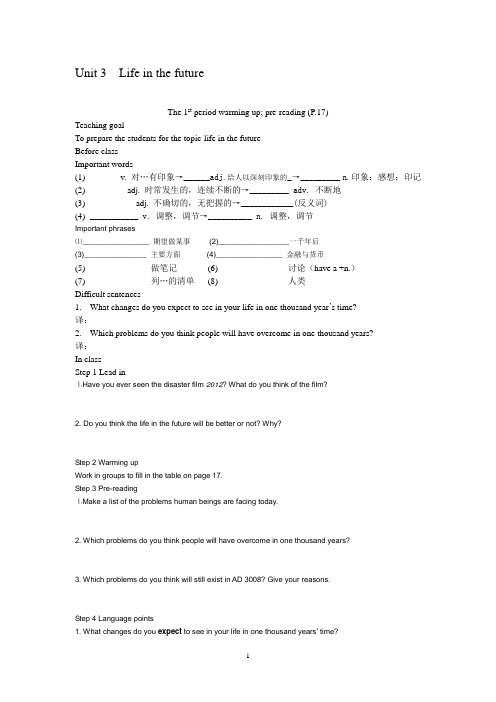
Unit 3 Life in the futureThe 1st period warming up; pre-reading (P.17)Teaching goalTo prepare the students for the topic-life in the futureBefore classImportant words(1)_______v. 对…有印象→______adj.给人以深刻印象的_→_________ n.印象;感想;印记(2)________ adj. 时常发生的,连续不断的→_________ adv. 不断地(3)__________ adj. 不确切的,无把握的→____________(反义词)(4)___________ v. 调整,调节→__________ n. 调整,调节Important phrases⑴________________ 期望做某事(2)_________________一千年后(3)_______________ 主要方面(4)________________ 金融与货币(5)______________ 做笔记(6)_______________ 讨论(have a +n.)(7)______________ 列…的清单(8)_______________ 人类Difficult sentences1.What changes do you expect to see in your life in one thousand year’s time?译:____________________________________________________________2.Which problems do you think people will have overcome in one thousand years?译:__________________________________________________________________In classStep 1 Lead in⒈Have you ever seen the disaster film 2012? What do you think of the film?2. Do you think the life in the future will be better or not? Why?Step 2 Warming upWork in groups to fill in the table on page 17.Step 3 Pre-reading⒈Make a list of the problems human beings are facing today.2. Which problems do you think people will have overcome in one thousand years?3. Which problems do you think will still exist in AD 3008? Give your reasons.Step 4 Language points1. What changes do you expect to see in your life in one thousand years’ time?一千年后你期望在你的生活中看到哪些变化?【及时归纳】expect是及物动词,意为“预料,盼望”,它有以下常见用法:⑴expect + n. / pron. 预计……可能发生;期待某人或某物⑵expect + to do sth. 料想做某事⑶expect sb. to do sth. 期望某人做某事⑷expect + 从句预计/ 料想……【趁热打铁】请根据汉语意思完成英语句子,每空一词。
普通高中英语必修5优秀教案Unit3

个人收集整理仅供参考学习人教版高中英语必修5教案Unit 3 Life in the FuturePeriod 1 Warming up and readingLearning aims:1. Learn some new words and expressions.2. Help the students to talk about life in the past, at present and in the future.3. Enable the students to describe the life in the past, at present and in the future. Important Points:To help students learn to read a narration about John Snow Difficult Points:To help students learn to describe peopleTeaching Procedures:Step 1 warming upShow the students some pictures or videos of the past and present life, and ask them their first impressions of the pictures.lead-in: Talk about how many changes there have been in the past and in the present.Step 2: pre-reading1. Can you tell what problems people are facing today?2. What problems do you think people in the future will have overcome? Which ones will still be there or even worse in AD3005?Key: 1. The problem of population will be solved, have begun to Control the birth rate.2. The problems will be still there, and will even worse.3. I don't think so. Now scientists are trying their best to develop new resourcesthat human beings can make use of ,such as solar energy. In my opinion…Step 3:fast reading1. Read the text for the first time and tell what the text is about?It's an e-mail written by a man Who has taken up a trip to the future.2. Look at the following sentence, there are in wrong order, tell me the correct order for these sentenceA. We were transported into the future by a comfortable time capsule.B. I arrived a t Wang Ping's home and everything in his house made me surprised.C.I won a travel to the year AD3005D. I have my first try to master a hovering carriage.Step 4 careful readingTask1. Questions & answers:1. Why did I have the chance to travel to the year AD3005?2. What is a “time lag”?3. How did I feel when I was in the capsule?4. Who guides my trip?- 1 - / 9个人收集整理仅供参考学习5. Why did my guide give me some tables?6. Who transported us to the future?Key 1. I took up the prize I won the year before.2. “Time lag”means a person gets flashbacks from his previous time period.3. The seats in the capsule are very comfortable.4. My friend Wang Ping is my guide to the future.5. The tablets could help me feel less nervous and uncertain6. Wang Ping's parents' company transported us to the future.Task 2. Fill in the Chart:Good changesBad changesTime travelCan travel toDifferent times After-effects of travelas you wishtransport.can move swiftlyDisorganized, difficult tofind waysave living spacehousesShort of spaceBusy, look likeTowns Easy to get lostMarketsOwn family Air qualityPoor quality in public placesoxygen supplyTask 4:Making a chain of events from the text First Impressions- 2 - / 9个人收集整理仅供参考学习Step 5: Discussion: Sample answers Ex.2 讨论总结I think the writer has an optimistic view of the future. He was very excited when he traveled to the year AD 3005 an d couldn't believe if was true. From this, we can see he is eager to go to the future. Though she was hit by the lack of fresh air.Period 2&3 Language focusLearning aims: To help students learn to use some important words and expressionsImportant Points:To help students learn to remember some important words andexpressionsDifficult Points:To help students learn to use some important words and expressionsTeaching Procedures:Step I RevisionHave a dictationStep II. Check the answers1)Check the answers of yesterday's homework (ing Words and Expressions) Warming up1. aspect n. 方面,外观You've only considered one aspect of the problem.The fierce aspect of the salesman frightened the customer off.Pre-reading2. overcome vt. 克服,战胜,找到处理问题地办法; 表示“压倒,受不了”时, 常用被动语态;be overcome with…“…之极, 极为…”He overcame the bad habit of smoking.We'll overcome the difficulty when we got to it.The child was overcome by weariness and slept.My mother was overcome with grief.Reading1. I still can't believe that I am taking up my prize that was won last year.Take up 开始从事,选修, 占用, 吸收When does the manager take up his job?he took up art in collegeHe decided to take up photography as his career.This table takes up too much room.Plants take up water.拓展:take 地词组take off 脱下, 起飞take over接管take to 喜欢上,对…产生好感Helen always helps her mother even though going to school ____ most of her dayA. takes upB. makes upC. saves upD. puts up- 3 - / 9个人收集整理仅供参考学习2.I have to constantly rub my eyes to remind myself that I have traveled to the year AD3005我得不断擦拭自己地眼睛来提醒自己,我已到了公元3005年remind: to make someone remember something that they must do这部影片使他回想起在中国所看到地一切.remind sb of sth 提醒某人…, 使某人想起…In case I forget, please remind me ofit.The film reminded him of what he had seen in China.remind sb to do sth Please remind me to write to my Mum. remind sb that/ where/how May I remind you that we agreed to start at 10:00?constantly adv. 经常地,不断地The area was constantly hit by drought.3. As a result, I suffered from ‘time lag”As a result: because of something that has happened结果,由于…地结果e.g He worked hard, and as a result, he got promoted quickly.V.S. as a result of…He was late as a result of snow.result from His failure resulted from not working hard enough.result in The accident resulted in his death.Suffer from: to experience 患有…为…所苦.he suffer from headache.发散思维:suffering n. 痛苦,劳苦sufferance n.容忍,忍耐4. This is similar to the “Jet lag”you get from flying. Bit instead it means you keep getting flashbacks from your previous time period.这种病有些像乘喷气式飞机高速飞行时所引起地时差反应那样,所不同是是,它意味着你地脑海里不停地从以前地时间断地直往回闪去a. similar / be similar to: 与…相似A cat is similar to a tiger in many respects.发散思维:similarity n. 类似,相似similarly: adv 相似地,同样地b. Keep doing something: 继续做某事It kept raining for a weekc. flashback : 闪回,倒叙The event in his happy family life are shown in flashback.d. previous adj. 先前地, 以前地He was there on the previous day.He has had no previous experience of this kind of job.5. Well-known for their expertise, his parents' company, called “Future Tours”…a. 过去分词known 作原因状语,相当于一个由as引导地原因状语从句As it waswell-known for…b. be known for…因…出名be known to…为…所熟知be known as…作为…- 4 - / 9个人收集整理仅供参考学习出名6. At first my new surroundings were difficult to tolerate.a. surroundings n.(常用pl.形式,谓语用复数) 周围事物,环境This hospital is in beautiful surroundings.The surroundings are very satisfactory.V.S. surrounding adj. 周围地His death made top news in the surrounding countryside.b. tolerate vt. 宽容, 忍受Our teacher won't tolerate any cheat in the exams.7. Hit by a lack of fresh air…lack vt.& vi. 缺乏;缺少;没有.例如:You lack courage/ strength/ability / experience.你缺乏勇气/力气/能力/经验.We didn't lack for money. 我们并不缺钱.(lack用作不及物动词时,常与for连用.一般用于否定句中.)n.缺乏;短缺地东西.(常与介词of连用).例如:She showed a lack of humor.她表现出缺乏幽默感.I can't buy the bike because of my lack of money.我因为缺钱而不能买那架自行车. for lack of 因为缺少.例如:We can't discuss the details now for lack of time.因时间有限,我们现在无法讨论细节.lacking a. 欠缺地,不够地be lacking in =be short of.例如:He seemed to be lacking both in intelligence and ability.他似乎在智力和哪里上都有缺欠.8. on one's feet 战立, 恢复, 自立Ford Motor Company is finally back on its feet after years of low sales.I can't stay on my feet any longer.9. press vi & vt.1)压;按;推.例如:She pressed the key / button / doorbell. 她摁按键/按纽/门铃.He pressed a handkerchief to his nose.他用手帕捂着鼻子.2)熨;熨平.例如:I've pressed your trousers with the iron. 我用熨斗熨了你地裤子.3)紧迫.例如:Time presses. 时间紧迫The problem of fuel presses for solution.这个燃料地问题急待解决.We'll let you know if anything presses. 如有紧急情况,我们会通知你地.n. 按;压.出版业;新闻界;例如:Flatten the dough with a press of the hand. 用手把生面团压平.the University Press 大学出版社- 5 - / 9个人收集整理仅供参考学习The power of the press is very great. 新闻界地力量非常.10. Just as I tried to make the necessary adjustment to this new situation , …adjustment: The act of adjusting or the state of being adjusted.He made adjustment to the machine.11. sight n. 视力;视野;情景,景象.例如:He has good/ poor (eye)sight 他视力好/差.She lost her sight.她眼睛瞎了.Keep out of my sight.不要让我看到你.I watched him until he disappeared from sight in the distance.我望着他直到他消失在远方.The sunset is a beautiful sight. 落日是很美地景象.常见地短语:be in sight 看得见;come in sight进入视线;out of sight不被看到;lose sight of…看不见...了;catch/ get/ have (a) sight of…发现, 看出;at first sight 乍一看.12.he was swept up into the center of them and my link with him was broken as I was carried up to top of a high building nearby.Sweep up:本意是打扫,清扫,经常引申为“横扫,掠过”等意思The leaves were swept up into the air by the wind13. as if /though 好象,仿佛,似乎;一般引导表语从句和状语从句.从句中地动词有时要用虚拟语气.例如:It looks as if it is going to rain. 看起来天要下雨了.You look as if you didn't care. 你看来一点也不介意似地.She walked as though she was/were floating on air. 她走路地样子像是在空中漂浮. Tom stared at h his father as though he had never seen him before. 汤姆盯着他父亲仿佛从来都没见过他似地.as if 常可引导省略地状语从句.例如:He glanced about as if (he was)in search of something. 他扫视着四周,像是在找什么东西似地.The lad started, as if (he was) awakened from some dream. 那小伙惊跳了起来,仿佛从梦中惊醒过来.14. Wang Ping's mother appeared, flashed a switch on a computer screen, and a table and chairs rose from under the floor as if by magic.王平地妈妈出现了,电脑荧屏上地开头闪了一下,于是一个桌子和几把椅子就像变魔术般地从地板下面升了起来switch : n. 开关where is the light switch?vi. 转换,改变:he got tired of teaching and switched to writing stories- 6 - / 9个人收集整理仅供参考学习开放思维:switch off 把…关掉,不听,不理睬switch on: 接通,把开关打开Switch out: 关上As if by magic= like magicHe jumped so high as if by magicmagical: adj 魔力地,不可思议地Magically adv 迷人地,不可思议地magician n:魔术师15. You may find it difficult as this is your first time travel trip当你第一次做这样地时间旅行时,可能会感到有些困难Find it difficult: 结构为“find+宾语+宾补”宾补可以是形容词,不定式,动名词,从句I found him to be much younger than I expectedDo you find him very bright?I find it hard to talk with himI find it very easy to learn English well.16. slide into “不知不觉地陷入”The car slid into the ditch.Period 4 Learning about languageTeaching aims: The Past Participle as the adverbial and attributeImportant Points:1.过去分词作定语(The past participle as the attribute)I followed him to collect a hovering carriage driven by computer.Tomorrow you will be ready for some visits organized by computer.Difficult Points:2.过去分词作状语(The past participle as the adverbial)Worried about the journey, I was unsettled for the first few days.Confused by the new surroundings, I was hit by the lack of fresh air.Teaching Methods:1.Inductive Method2.Group workTeaching Procedures:Step I DictationLet the students have a dictation.Step II. Grammar和现在分词及短语一样,过去分词(past participles)或过去分词短语(past participial phrases)也可以充当副词,修饰谓语动词.过去分词短语可以表达下列四种意思:(1)方法或活动方式,如:●He walked up and down, lost in thought.●I sat before the desk until after mid-night, absorbed in writing.- 7 - / 9个人收集整理仅供参考学习●Surrounded by a host of fans, the film star left the airport excitedly.(2)原因,如:●Greatly disappointed, some staff decided to leave the place.●Taken by surprise, the enemy surrendered.(3)时间,如:●Born and bred in a turbulent age, the older generation of people experienced all sorts of hardships.●Thrown to the floor, the boy regained his footing a few minutes later.(4)条件,如:●Given more time, the slow learners would have done better.●Criticized by someone else, Tony would not have flared up like that.除了直接修饰动词之外,过去分词或短语也可以和连词合组成短语,表示下列四种意思:(1)由when, whenever, while, until 等连词引导,表示“时间”,如:●When asked about his previous job, Bill said he had been a motor mechanic.●Susan seldom speaks in class until spoken to.(2)由where, wherever 连词引导,表示“地点”,如:●Mosquitoes should be completely exterminated where found.●Retirees in good health should be invited to return to work wherever needed. (3)由if, unless 引导,表示“条件”,如:●If kept for too long, some medicines will lose their effectiveness.●We have made a point of not attacking unless attacked.(4)由though, although, even though 连词引导,表示“让步”,如:●Though warned of the danger, they still went mountaineering.●Even though defeated for a second time, our team did not give up hope for the ultimate victory.此外,过去分词短语还可以和介词“with”或“without”连用,具副词作用.如:●With the water pipe choked, there wasn't any more water for use.●Without anything left in the kitchen, the Wangs decided to eat out.最后,过去分词短语,在适当情况下,可以有自己地主语而变成独立结构(the absolute construction),如:●The old man listened, his head inclined to one side4. Studying the past participle as the attribute过去分词作定语,在语态上,表被动;在时间上,表示动作已经发生或完成,与它所修饰地名词有逻辑上地动宾关系.过去分词作定语时,所修饰地名词在逻辑上相当于被动句中地主语,过去分词相当于谓语.过去分词作定语表示动作在谓语动作之前发生,已经完成并具有被动意义.有时也不表示时间性.作定语地过去分词一般由及物动词变来,因为只有及物动词才有被动意义.例如:He is a teacher loved by his students. 他是个很受学生爱戴地老师.也有用不及物动词地过去分词作定语地情况,一般作前置定语,它不表示被动意义,只表示主动意义,强调动作完成.不能像及物动词地过去分词那样放在名词后面作定语.例如:fallen leaves 落叶, retired workers 退休工人, the risen sun 升起地太阳- 8 - / 9个人收集整理仅供参考学习注意下面过去分词作定语地几种情况:A. 单个地过去分词作定语一般放在被修饰地名词之前.例如:We needed much more qualified workers. 我们需要更多地合格地工人.My friend is a returned student. 我地朋友是个归国地留学生.单个分词也可以作后置定语,用以强调动作.例如:They decided to change the material used. 他们决定更换使用地材料.B. 过去分词短语作定语要放在被修饰地名词后面,作后置定语,其作用相当于一个定语从句.例如:The student dressed in white is my daughter.(=The student who is dressed inwhite is my daughter.)C. 如果被修饰地词是由every/some/any/no+thing/body/one所构成地复合代词或指示代词those等时,即使一个单一地分词作形容词用,也要放在被修饰词地后面.例如:Is there anything unsolved?There is noting changed here since I left this town.D. 单个过去分词前加一名词或副词,常用连字符将它们连接起来构成一个复合形容词,放在其修饰地名词前,作前置定语.分词前加地名词表示分词地动作或行为主体,所加地副词表示方式、时间、程度、性质等意义.例如:This is a state-owned factory.This is our school-run factory.E. 作前置定语地某些动词地过去分词地形式与作谓语或表语地过去分词地形式往往不一样.例如:原形用作定语地过去分词用作表语或谓语地过去分词drink drunken drunklight lighted lit litmelt melten meltedsink Sunken SunkWe lit the candle and the candle lit up the room. 我们点着蜡烛,蜡烛照亮房间. There is a lighted candle on the table. 桌上有一支点着地蜡烛.5.Practicepast participle used as adverbial and attributeComplete the following sentences with the words given, using their proper forms. 1, I like reading the novels______ (write) by him2. The girl ________(write) a letter is my cousin3. There is something wrong with my bike and I have to get it __________(repair).4.He spoke loudly in order to make himself ____ (hear)- 9 - / 9。
英语必修5unit3集体备课.doc

Unit 3 Life in the future (集体备课)——上犹中学高二英语备课组1.教材分析本单元以“Life in the future”为中心话题,旨在通过本单元的学习,让学生大胆发挥想象,对人类今后的生活环境,生活方式进行猜测,并在此基础上,对人类的种种活动进行反思,提倡环保生活意识。
同时让学生学会过去分词作定语和作状语的不同用法。
最后让学生将本单元所讨论的话题和推测手法相结合,学习怎样写report。
1.1Warming Up部分利用一个关于“住”和“行”的对比研究表格引导学生回顾过去,认识现在和展望未来。
通过这一活动,引发学生对过去,现在和未来的思考,使学生对将要阅读的文章有个知识准备。
1.2Pre-reading部分让学生充分运用发散思维,先列举当今世界人类面临的一些突出问题,然后要求学生思考为什么会产生这些问题,这些问题中哪些在未来社会仍然可能存在,哪些将会被克服,哪些将会恶化。
为下面的阅读做了铺垫。
1.3Reading部分通过一封发自未来的电子邮件,讲述了作者Li Qiang怎样安全到达“未来世界”,他对“未来世界”的印象,以及“未来世界”的日常生活方式和交通工具情况。
阅读时要把重点放在“未来世界”生活与当今生活的不同点上。
1.4Comprehending部分设计了三个教学活动来加深学生对Reading部分的理解。
第一个活动要求学生通过阅读找出“未来世界”在以下几个方面的变化:跨时空旅行,交通,住房,城镇环境和空气质量。
接着让学生在此基础上得出自己的结论,哪些变化好,哪些变化不好,并说明理由。
第二个活动要求学生通过阅读来判断Li Qiang对“未来世界”的态度是乐观的还是悲观的。
学生要在文中找出支持自己观点的论据,尽可能说服别人。
第三个活动让学生想象一下Li Qiang 将会去参加哪些活动。
这样既鼓励学生展开丰富的想象,又为Using Language部分的语篇学习做了铺垫。
《Unit 3 What would you like》集体备课表4

1. B. Let’s try
(1)明确听力任务
(2)第一次播放教学录音,学生根据录音内容连线。
五、课堂小结(Summary)
小结本课的重要句型并对学生的饮食习惯进行必要的引导。
T: When you like something, you can say…
2.教师随机出示上节课学习的五个单词的词卡,全班学生表演相应的动作。
二、课前预习(Preview)
猜一猜
教师请两三位学生上讲台,写出自己最喜欢的食物,其他学生猜一猜,如:
T: Guess! What’s her / his favourite food?
Ss: Ice cream?
T: No, guess again.
Ss: Salad?
T: Yes, you’re right.
三、新课呈现(Presentation)
1. B. Let’s talk
(1)教师在黑板上画出自己喜欢吃的几种食物,说:“Look! There is ice cream, hamburgers, bread and noodles on the blackboard. They are food. They are my favourite food.”,教师边说边在黑板上画几个笑脸,帮助学生理解“favourtite food”的意思。
(2)介绍对话情景。
T: Sarah and Zhang Peng are talking about today’s menu. Let’s go and see what they would like to eat today.
(3)教师出示本部分的教学挂图,问:“What food and drink are in today’s menu?”,学生根据情景图回答:“There are noodles, beef, fish, sandwich, tomato soup and milk in today’s menu.”。
- 1、下载文档前请自行甄别文档内容的完整性,平台不提供额外的编辑、内容补充、找答案等附加服务。
- 2、"仅部分预览"的文档,不可在线预览部分如存在完整性等问题,可反馈申请退款(可完整预览的文档不适用该条件!)。
- 3、如文档侵犯您的权益,请联系客服反馈,我们会尽快为您处理(人工客服工作时间:9:00-18:30)。
Unit 3 Life in the future (集体备课)——上犹中学高二英语备课组1. 教材分析本单元以“Life in the future”为中心话题,旨在通过本单元的学习,让学生大胆发挥想象,对人类今后的生活环境,生活方式进行猜测,并在此基础上,对人类的种种活动进行反思,提倡环保生活意识。
同时让学生学会过去分词作定语和作状语的不同用法。
最后让学生将本单元所讨论的话题和推测手法相结合,学习怎样写report。
1.1 Warming Up 部分利用一个关于“住”和“行”的对比研究表格引导学生回顾过去,认识现在和展望未来。
通过这一活动,引发学生对过去,现在和未来的思考,使学生对将要阅读的文章有个知识准备。
1.2 Pre-reading 部分让学生充分运用发散思维,先列举当今世界人类面临的一些突出问题,然后要求学生思考为什么会产生这些问题,这些问题中哪些在未来社会仍然可能存在,哪些将会被克服,哪些将会恶化。
为下面的阅读做了铺垫。
1.3 Reading 部分通过一封发自未来的电子邮件,讲述了作者Li Qiang怎样安全到达“未来世界”,他对“未来世界”的印象,以及“未来世界”的日常生活方式和交通工具情况。
阅读时要把重点放在“未来世界”生活与当今生活的不同点上。
1.4 Comprehending 部分设计了三个教学活动来加深学生对Reading部分的理解。
第一个活动要求学生通过阅读找出“未来世界”在以下几个方面的变化:跨时空旅行,交通,住房,城镇环境和空气质量。
接着让学生在此基础上得出自己的结论,哪些变化好,哪些变化不好,并说明理由。
第二个活动要求学生通过阅读来判断Li Qiang对“未来世界”的态度是乐观的还是悲观的。
学生要在文中找出支持自己观点的论据,尽可能说服别人。
第三个活动让学生想象一下Li Qiang将会去参加哪些活动。
这样既鼓励学生展开丰富的想象,又为Using Language部分的语篇学习做了铺垫。
1.5 Learning about Language部分突出了本单元的一些重点词汇及语法。
首先通过完成语篇来考查学生运用本单元词汇的能力,并且通过练习,让学生区分两种动词短语,一种是以动词为中心的词组,另一种是以介词为中心的词组。
语法部分要求学生主动找出阅读语篇中的重点结构——过去分词作定语和状语,然后加以应用。
1.6 Using Language 部分涵盖了听,说,读,写四项语言基本技能。
要求学生通过阅读I HAVE SEEN AMAZING THINGS 一文,对Li Qiang旅行的第三站有个总体的印象,并能找出部分细节知识。
1.7 SUMMING UP 部分归纳了本单元的主要学习内容并让学生自我检测一下学习效果。
1.8 LEARNING TIP 部分告诉学生在讨论时记笔记的好处和方法。
2. 教材重组2.1 可将Warming Up, Pre-reading, Reading 和Comprehending 整合在一起上一节精读课。
2.2 Using Language 中的reading 和listening 是Li Qiang’s travel to the future的延续,可将这两部分及Workbook 中的LISTENING整合起来上一节听力课。
2.3可将Learning about Language 和Workbook 中的USING WORDS AND EXPRESSIONS 及USING STRUCTURES整合起来上一节语法课。
2.4 将Workbook 中的READING TASK 和LISTENING TASK 结合起来上一节泛读课,进一步拓展学生的思维和想象力。
2.5 将Using Language中的speaking 和Workbook中的TALKING 整合在一起上一节口语课,鼓励学生对现在进行反思,对未来进行大胆猜测(make predictions)。
2.6 将Workbook 中的SPEAKING TASK 和WRITING TASK 整合起来上一节写作课,同时对整个单元进行一个小结。
3. 课型设计与课时分配1st Period Reading2nd Period Listening3rd Period Grammar4th Period Extensive Reading5th Period Speaking6th Period Writing2.教学重点难点:(一)单词·巧记·典句·考点1. vehicle[v'i:ikl]n.交通工具;车辆【巧记提示】词根vect,“传送;运载”。
【经典例句】The street is dominated by car vehicles.街道上满是车辆。
【考点聚焦】1)vehicle 特指陆地上的交通工具。
2)vehicle还可以指“(思想、情报的)传达手段、媒介”,如:This radio station has become a vehicle for conservative opinion.这家电台已成为保守派意见的传播管道。
3)常见同义词有conveyance n.运输;财产让与;运输工具;carriage n.四轮马车;客车2. private[p'rivit] adj.私人的;私有的【巧记提示】priv(单独;个别;私下)+-ate(具有或显示某性质)。
【经典例句】This is private parking lot, you cannot park here.这是私人的停车点,你不能在这里停车。
【考点聚焦】1)固定搭配:in private 秘密的;不公开的;私下的反义词:in public 公开的;公众的2)同根词:privacy n.私生活;隐私如:Telling that on TV was invasion of her privacy.在电视上谈论那件事侵犯了她的隐私权。
']n.印象;感想;印记3. impression[im pre【巧记提示】im(置于某状态或条件中;向内)+press(给……以压力)+ion(表示行为;行为的状态或结果)【经典例句】His speech made quite an impression on the audience.他的演说给听众留下了相当好的印象。
【考点聚焦】1)固定搭配:leave/make/have a...impression 给某人留下……印象be under the impression that... 觉得;以为his impression of her=her impression on him 她给他留下的印象2)其动词形式impress用法:impress 作“使(某人)印象深刻”时,通常用于被动语态:be impressed by/at/with sth.或be impressed on one’s mind/memory。
如:The teachers were most impressed by your performance in the exam.所有老师被你们的考试成绩所深深感动。
4. constantly[k'nst ntli]adv.不断地【巧记提示】constant(adj.持续的)+-ly(副词后缀)【经典例句】His report was constantly interrupted by applause.他的报告频频被掌声所打断。
【考点聚焦】constantly经常和进行时连用,如:I’m constantly telling her to behave herself.我不断地告诉她要守规矩。
5. remind [ri m'aind]vt. 提醒;使想起【巧记提示】re-(再;又)+mind(想)【经典例句】The sight of the clock reminded me that I was late.看到钟使我想起我已经迟到了。
【考点聚焦】1)固定搭配:remind...of...使……回想起;意识到……,如:The play reminds me of the war years.这部戏剧使我想起了战争年代。
2)作“回忆起”解时,其同义词为recall。
如:I recall stories that my father told me years ago.我还记得爸爸几年前给我讲的故事。
6. opening[ 'p ni] n.通路;开口;开端【巧记提示】open(v.开)+-ing(名词后缀,表示“结果;产物”)【经典例句】He put a gate across the opening in the fence.他在围墙的开口处安了一个门。
【考点聚焦】opening意为“开口;洞口;空缺”时,为可数名词;当意为“开始;开头”时,为不可数名词。
如:The sheep got out through an opening in the fence.羊从围栏的破洞中跑了出去。
7. lack [læk] n. &v.缺乏;没有【经典例句】n.She showed a lack of humor.她缺少幽默。
v. A coward lacks courage.怯懦者缺乏勇气。
【考点聚焦】辨析lack与shortage:lack是一个通用性名词,指整体或局部的不足;shortage在表示局部欠缺方面与lack同义,但它在指固定的、必须的或一般习惯量的总数不足时,比lack所表示的不足更甚。
我的记忆卡固定搭配:for lack of 因缺乏……have no lack of 不缺乏……lack for nothing 一无所缺be lacking in 缺乏8. press[pres] n. &v.按;压;逼迫;印刷;新闻【经典例句】v.He pressed the doorbell.他按了门铃。
n.The book was favorably noticed by the press.此书颇获新闻界好评。
【考点聚焦】固定搭配:press on/upon1)努力继续或前进,如:The boys pressed on in spite of the wind.男孩子们不顾大风继续前进。
2)把……强加于,迫使接受,如:I wish he’d stop trying to press his views upon his students.但愿他不再把他的观点强加给学生。
9. sight[sait] n.视力;视觉;见【巧记提示】词根:see,表示“观察;看;与眼有关的”。
